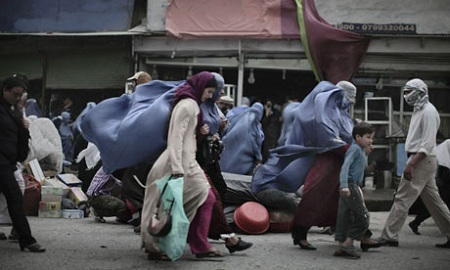By Madeleine Bunting
Women's rights have been central to the war in Afghanistan. Remember when Cherie Blair and Laura Bush joined forces to bolster the rationale for invasion back in 2001? Suddenly, the west developed a passionate concern for the position of women in the country; there were films, books and documentaries about the high rates of maternal mortality, girls being married off young and low levels of female literacy. There was an assumption that it only required an invasion for women to spontaneously rise up and throw off their burqas.
But change proved slower than expected. For several years, reporters were surprised to find that the burqa count on the streets of Kabul had not declined as fast as expected. As we approach the 10th anniversary of the invasion on 7 October 2001, there is a reckoning of what has been achieved for women – and what has failed. And there is a growing realisation that recent developments are reversing earlier gains, and that - with only three and a half years before coalition forces withdraw - time is now running out.
The biggest achievement has been in education, with 2.4 million girls in school, although there is still a high drop-out rate and the numbers going on to secondary school are small. But the fact is that the conservative nature of rural Afghanistan has not changed fundamentally. Over the past 10 years a colossal $57 bn has been spent in aid in Afghanistan, but it has not had any impact on the entrenched attitudes shaping women's lives.
The security situation has become increasingly dangerous in the past few years. A recent attack on local staff employed by Oxfam, which led to three deaths, is believed to have been caused partly by the practice of employing women. Attacks on girls' schools and women teachers continue.

When the Afghan invasion took place in 2001, it was assumed burqa-clad women would become a thing of the past. It hasn't happened. (Photo: Mauricio Lima/AFP)
"Those who work outside the house risk their lives every day," says Zarghuna Kargar, an Afghan author and journalist, who presented the Afghan Woman's Hour on the BBC World Service. "They face risks from their neighbours, their colleagues and strangers in the street. I don't see any evidence of a cultural shift over the last 10 years. There are still strong roots to the traditions."
Kargar added that one of the country's few female police officers had been killed, as was a young woman working for a foreign NGO. For a woman, going out to work can get her killed.
"I know it will take time to change these things. We have been trained for patience in Afghanistan, but we are losing hope after 10 years and fear that it will become a forgotten state, and it will go back to how it was," said Kargar.
Foreign pressure ensured that the constitution and the country's legal system enshrined women's rights, but the reality is very different. There are only a handful of female judges and even when women do have the courage to take a case to the police, they face entrenched discrimination.
Inevitably, after 10 years of huge investment and such a patchy record of achievement, next month's anniversary will provoke a lot of soul searching in aid agencies about what went wrong in Afghanistan.
Perhaps one of the most complex aspects of the conflict has been the blurring of boundaries between development and military occupation. The coalition's provincial reconstruction teams have been involved in building schools and clinics, reducing the neutral humanitarian "space" in which NGOs can work.
But there is an equally important and complex issue surrounding how a western NGO can effect change in entrenched social attitudes. There are success stories from other parts of the world. Oxfam points to its support for a coalition of grassroots organisations in India and Bangladesh which has campaigned against domestic violence and helped shift the popular understanding of what is acceptable. But the key requirement for any success is that both women and men have to see the advantage of change. In Afghanistan, this model of change has failed. Attempts to develop a comparable campaign around honour killing have petered out.
Many NGOs now fear that, after western forces withdraw, it will become almost impossible to work in the country. Ten years on, the anniversary of the invasion is likely to be a sombre event, and it is very unlikely to talk much about women. Used as a rationale for invasion, the plight of women's rights is increasingly an embarrassing failure.



